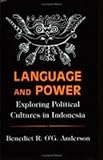Language and Power : Exploring Political Cultures in Indonesia / Benedict R. O'G. Anderson.
Material type: TextSeries: The Wilder House series in politics, history, and culturePublisher: Ithaca, NY : Cornell University Press, [2018]Copyright date: ©1991Description: 1 online resource (352 p.)Content type:
TextSeries: The Wilder House series in politics, history, and culturePublisher: Ithaca, NY : Cornell University Press, [2018]Copyright date: ©1991Description: 1 online resource (352 p.)Content type: - 9781501720604
- 306.2/09598 20
- JQ776 .A64 1990
- online - DeGruyter
| Item type | Current library | Call number | URL | Status | Notes | Barcode | |
|---|---|---|---|---|---|---|---|
 eBook
eBook
|
Biblioteca "Angelicum" Pont. Univ. S.Tommaso d'Aquino Nuvola online | online - DeGruyter (Browse shelf(Opens below)) | Online access | Not for loan (Accesso limitato) | Accesso per gli utenti autorizzati / Access for authorized users | (dgr)9781501720604 |
Frontmatter -- Contents -- Introduction -- Part I. Power -- I. The Idea of Power in Javanese Culture -- 2. Further Adventures of Charisma -- 3. Old State, New Society: Indonesia's New Order in Comparative Historical Perspective -- Part II. Language -- 4. The Languages of Indonesian Politics -- 5. Cartoons and Monuments: The Evolution of Political Communication under the New Order -- 6. Sembah-Sumpah: The Politics of Language and Javanese Culture -- Part III. Consciousness -- 7. A Time of Darkness and a Time of Light: Transposition in Early Indonesian Nationalist Thought -- 8. Professional Dreams: Reflections on Two Javanese Classics -- Index
restricted access online access with authorization star
http://purl.org/coar/access_right/c_16ec
In this lively book, Benedict R. O'G Anderson explores the cultural and political contradictions that have arisen from two critical facts in Indonesian history—that while the Indonesian nation is young, the Indonesian state is ancient, originating in the early seventeenth-century Dutch conquests; and that contemporary politics are conducted in a new language, Bahasa Indonesia, by peoples (especially the Javanese) whose cultures are rooted in medieval times. Analyzing a spectrum of examples from classical poetry to public monuments and cartoons, Anderson deepens our understanding of the interaction between modern and traditional notions of power, the meditation of power by language, and the development of national consciousness.This volume brings together eight of Anderson's most influential essays written over the past two decades. Most of the essays address aspects of Javanese political culture—from the early nineteenth century, when the Javanese did not yet have words for politics, colonialism, society, or class, through the early nationalism of the 1900s, to the era of independence after World War II, when deep internal tensions exploded into large-scale massacres. In the first group of essays Anderson considers how power was imagined in traditional Javanese society, and how these imaginings shaped Indonesia's modern politics. Other essays focus on the significance of the incongruences between the egalitarian, ironizing national language through which modern Indonesia has been imagined and the powerful influence of the hierarchical, authoritarian Javanese official culture. Finally, two essays on consciousness illuminate the crucial eras before and after the rise of Indonesia's nationalist movement. One reflects on Javanese intellectuals' phantasmagoric efforts to keep imagining "Java" as the island was overrun by colonial capitalism and absorbed into the huge, heterogeneous Netherlands East Indies; the second traces the transition from old culture to new nation through the autobiography of an eminent Javanese first-generation nationalist politician.
Mode of access: Internet via World Wide Web.
In English.
Description based on online resource; title from PDF title page (publisher's Web site, viewed 26. Apr 2024)


